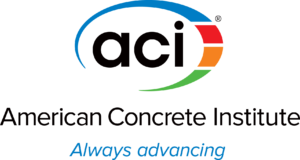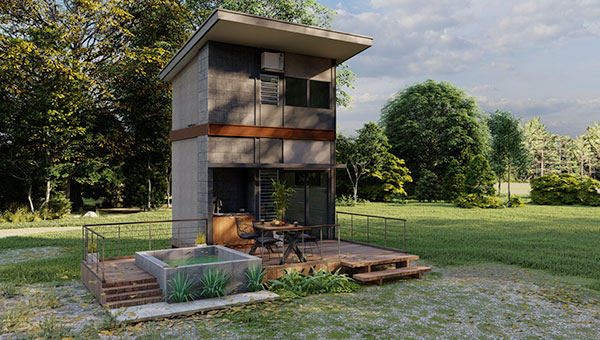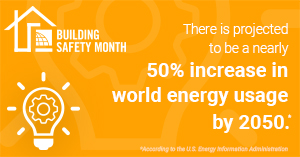
Planning for a Safe & Sustainable Tomorrow
WEEK ONE // May 1–8, 2022
Sponsored by: 
Planning for a Safe & Sustainable Tomorrow
WEEK ONE // May 1–8, 2022
Sponsored by: 
Safety and sustainability relies on action at the individual and community level. The building safety industry is focused on creating safe & sustainable construction by addressing the key areas of energy efficiency, building science and innovation.
The International Code Council works with its industry partners and membership to address the needs of individual communities around the world. Each community is unique – some are leading the way in green building practices and carbon reduction efforts while others are just getting started.
No matter where your community is on this journey and by taking actions in your own home, you can help by learning about safety and sustainability and the innovative technologies that are paving the way for a better future for all of us.
The Impact of Energy Use in Our Communities
Energy fuels our lives. Yet, energy use and associated greenhouse gas emissions can pose significant challenges to communities, homeowners and renters, and business owners. For example:
- Americans currently spend more than $200 billion annually on energy bills.
- Energy use impacts housing affordability. Low-income households spend three times as much on energy bills as higher income households.
- Globally, buildings and building construction sectors combined are responsible for over one-third of global final energy consumption and nearly 40 percent of total direct and indirect CO2 emissions.
Building energy codes are at the core of improving energy efficiency and resiliency in the built environment. These codes contribute to the health, safety and welfare of communities and citizens by reducing energy bills, improving occupant and community health, enhancing resilience from natural and man-made hazards, and reducing greenhouse gas emissions.
More Resources to Check Out
Watch the Code Council's Facebook Live featuring Ryan Colker, VP of Innovation, as he speaks about Planning for a Safe and Sustainable Tomorrow.
The Code Council in Action
The Code Council family of solutions has resources available to assist communities, builders and manufacturers with building energy efficiency ranging from support for adoption and implementation of the International Energy Conservation Code (IECC) to a toolkit for states and communities with advanced energy efficiency and carbon reduction goals.
- IECC Adoption
- Compliance and Enforcement
- Net Zero Energy and Decarbonization
- Resources and Model Policies
The Code Council launched the Code on a Mission campaign to encourage communities to realize the benefits of the 2021 IECC. Check out these resources to share with your communities:
What is Building Resiliency?
Building resiliency speaks to how successfully a building can adapt or recover from adverse events.
Resilient buildings require diligent planning and innovative thinking. Effectively utilizing current codes and standards throughout all phases of the building’s lifecycle increases the efficacy of new building technologies and offers a cost-effective path toward community stability during times of disaster. Resilience starts with strong, regularly updated, and properly implemented building codes. Resiliency is then maintained by conducting regular maintenance and inspections.
There are important measures that can be taken at the community level to increase building resiliency.
Here are a few basic steps:
- Evaluate the community's current resilience through benchmarking. Benchmarking allows a community to identify how resilient they currently are and the steps they can take to improve.
- Regularly update building codes. Up-to-date codes can save $11 for every $1 invested.
- Undertake a comprehensive resilience planning process.
Here are some resources available to assist municipalities, manufacturers and the public with building resiliency.
- National Risk Index for Natural Hazards
- Resilience Analysis and Planning Tool
- Hazard Mitigation Planning
- Nationwide Building Code Adoption Tracking
- Federal Financial Assistance Programs for Resilience Activities
The Code Council in Action
The Formation of the Alliance for National and Community Resilience (ANCR)
The Alliance for National and Community Resilience (ANCR) is a Code Council co-founded 501(c)3 aimed at improving resilience and implementing good community practices in towns and cities across the U.S. The Code Council and ANCR are working on developing community resilience benchmarks across all community functions.
Setting Community Resilience Benchmarks
ANCR is developing a series of benchmarks covering key requirements aimed at increasing the resiliency of communities. The first benchmark pilot, covering buildings, addresses the adoption, administration and enforcement of building codes. The second benchmark on housing address the availability of affordable housing, the quality of housing, the availability of shelter, and continuity planning in the event of a disaster. The third benchmark was released in 2020 and address addresses resilience of drinking water, wastewater and stormwater systems. For communities interested in the benchmarks, click here.
ANCR also produced two white papers on the contributions of the International Building Code (IBC) and the International Energy Conservation Code (IECC) to resilience. These are the first two in a series examining how specific International Codes (I-Codes) support resilience. ANCR also developed Building Community Resilience Through Modern Model Building Codes to help explain how building codes contribute to resilience.
Martinsville, VA, and Oakland Park, FL, are the first communities recognized by ANCR for their resilience.
Join the Virtual Event!
Week 1 Event:
Tiny Homes and Affordability
Tuesday, May 3
3–4 pm ET

Creation of Global Resiliency Resources
In 2019, the Code Council launched a global initiative to bring together experts from the U.S., Australia, Canada and New Zealand to improve building resilience worldwide. This new collaborative forum provides a valuable opportunity for participants to discuss common struggles, and to share knowledge, research and best practices, as they considered the role of building codes in resilience and durability in the face of increasingly severe weather events.
In 2021, the group released two reports. The first was a report that explored how forward-looking climate data is used in building codes around the world. The second report, presented at the COP26 Climate Conference, took a deeper look at the challenges of integrating climate science and building science in the U.S., Canada, Australia and New Zealand provides the foundation for the International Building Resilience Guidelines that will be released in 2022.
Sustainability & Green Building
Green building and sustainable construction strategies reinforce the societal health, life and safety benefits that building codes offer, providing resilience to natural disasters, a changing climate, resource consumption and management, and service interruptions due to unforeseen events. These tools can also aid occupant comfort and health, save money and preserve resources during the design, construction and operation of buildings. Many homeowners, businesses and building professionals have voluntarily sought to incorporate green and sustainable building strategies into their projects, and a number of systems have been developed to guide green building practices.
The International Energy Conservation Code (IECC) addresses energy efficiency on several fronts including cost savings, reduced energy usage, conservation of natural resources and the impact of energy usage on the environment. Key changes to the 2021 IECC improve efficiency by 9.4 percent and reduce greenhouse gases by 8.7 percent over the 2018 IECC; these changes include new provisions that increase efficiency and encourage greater flexibility in design and construction as well as changes to existing requirements that provide clarification and improve usability of the Code.
The 2021 International Green Construction Code (IgCC) provides the design and construction industry with a very effective way to deliver sustainable, resilient, high-performance buildings. The 2021 IgCC provides fundamental criteria for energy efficiency, resource conservation, water safety, land use, site development, indoor environmental quality and building performance that can be broadly adopted.
The International Code Council with sponsorship from ASHRAE, the leading global HVAC&R membership society, created a new International Green Construction Code (IgCC) certification, the Commercial Green Construction Professional. Commercial Green Construction Professionals will help develop new standards for building construction that will address the problem of greenhouse gas (GHG) emissions and help reinforce societal health, life and safety benefits,
Ways To Support Code Compliance
As mentioned earlier, codes are at the core of building resiliency and sustainability, but they must be properly enforced. Here are some ways to help your community support code compliance.
The Development of Code Compliant Building Products
The certification and accreditation of building products are critical to the building code enforcement process. Technical evaluations of building product listings and plumbing, mechanical and fuel gas listings provide regulators and construction professionals with clear evidence that products and systems comply with codes and technical standards.
The ICC Evaluation Service (ICC-ES) issues reports on product code compliance that are made available free of charge to code officials, contractors, specifiers, architects, engineers and anyone else with an interest in the building industry and construction.
Accreditation of Entities that Support Code Compliance
There is a need for independent verification that businesses, organizations and governmental entities that facilitate building codes and standards are competent and comply with industry and/or international standards. The International Accreditation Service (IAS) accredits testing and calibration laboratories, inspection agencies, building departments, fabricator inspection programs and special inspection agencies to ensure adherence to acknowledged standards.
Building Department Codification
Codification is the process by which local governments keep their laws organized, structured and updated to serve as a reliable legal reference. General Code updates and digitizes local codes, integrating new laws into the existing code. It works with municipalities to create a single, consistent resource and compiles the information into a comprehensive code. It subsequently publishes this code resource in print or in a convenient online platform.
ICC-Community Development Solutions (ICC-CDS) offers software solutions that allow building departments and code enforcement officers to streamline and track information associated with the inspection and compliance process.
Funding for Building Code Activities
FEMA's Building Resilient Infrastructure and Communities (BRIC) grant program can fund a wide range of eligible building code-related activities under the state/territory Allocation and tribal Set-Aside. Eligible activities are those that evaluate adoption and/or implementation of building codes that reduce risk; enhancing existing adopted building codes to incorporate more current requirements or higher standards; and developing professional workforce capabilities through technical assistance and training.
HUD's Community Development Block Grant funds can be used for select code enforcement activities.
Growing Technologies in the Construction Industry
Offsite Construction
Off-site construction, also called pre-fab or modular construction, is essentially the planning, design, fabrication and assembly of different parts of a building done at a location other than where they will be finally installed. This method supports rapid and efficient construction of the buildings you see in your cities and towns.
While the concept of offsite construction dates back as far as 1895, and became popular for a while at the turn of the century, today’s offsite construction growth is being fueled by several things:
- Increased need for affordable, sustainable housing
- Shortage of construction materials and workers
- Desire to work in better conditions with better outcomes
- Ability to scale construction projects quickly
- Ability to lower the environmental impact of construction projects
The Code Council has partnered with the Modular Building Institute (MBI) to develop comprehensive standards that address all parts of the off-site construction process (including IRC appendix Q which addresses standards for tiny homes), from planning & design to offsite construction materials are fabricated, transported and assembled.
Learn more about offsite construction:
- Download the Off-site Solutions Infographic
- Read Frequently Asked Questions about Off-site Construction
- Learn more about how the Code Council Family of Solutions is working to provide off-site solutions to your communities through services and the development of standards
Remote Virtual Inspections
Remote Virtual Inspections, also known as RVI, are a form of inspections which use visual or electronic aids to allow an inspector or team of inspectors to observe certain types of construction, products and/or materials from a distance.
RVI are a solution to help inspectors observe construction and objects that might be inaccessible or in dangerous environments, or where circumstances or conditions prevent an in-person inspection.
Learn more about remote virtual inspections:
- Download the infographic
- Read “Recommended Practices for Remote Virtual Inspections (RVI)”
- View the RVI Safety Toolkit
Join the Virtual Event!
Week 1 Event:
Tiny Homes and Affordability
Tuesday, May 3
3–4 pm ET


